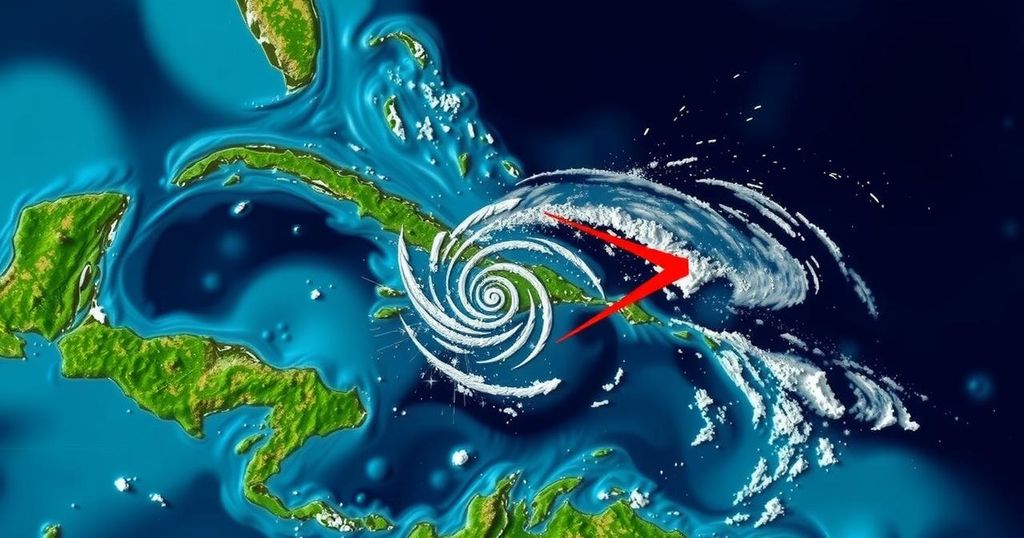Tropical Storm Oscar is progressing towards the Bahamas after making landfall in Cuba as a Category 1 hurricane, resulting in six deaths and substantial rainfall. Currently, it is experiencing winds of 40 mph and is expected to drop heavy rain across the Bahamas. Oscar is noted for being the smallest hurricane on record, catching many forecasters by surprise. The Atlantic hurricane season is projected to be above-average this year, with Oscar being the 15th named storm.
Tropical Storm Oscar is currently advancing towards the Bahamas after impacting Cuba as a Category 1 hurricane, resulting in at least six fatalities due to its heavy rainfall. The storm, which was reported to be located 45 miles south-southeast of Long Island, Bahamas, had sustained winds of 40 mph and was moving north-northeast at a speed of 12 mph, as stated by the National Hurricane Center in Miami. At present, Oscar is classified as a marginal tropical storm. The storm is expected to deposit significant rainfall across the southeastern Bahamas, with forecasts indicating accumulations of up to 5 inches, and isolated areas may see as much as 8 inches. In response to these conditions, a tropical storm warning remains in effect for the central and southeastern regions of the Bahamas. Remarkably, Oscar has established itself as the smallest hurricane on record, possessing a wind field of merely 6 miles wide. Its unexpected intensification took many meteorologists by surprise, particularly following its landfall on Grand Inagua Island on Saturday and its second landfall in eastern Cuba late Sunday. Michael Lowry, a hurricane specialist, remarked, “It’s not often we see a colossal failure in hurricane forecasting” while highlighting a lack of models predicting Oscar’s transition into a hurricane. In eastern Cuba, the storm has already left its mark, with rainfall exceeding 15 inches in certain areas and warnings of flooding and landslides. The fatalities were reported in Guantánamo, adding to the island’s challenges as it deals with a recent massive power outage that had triggered protests and resulted in stern government warnings about civil unrest. Oscar marks the 15th named storm and the 10th hurricane of the Atlantic hurricane season, which typically runs from June 1 to November 30. The National Oceanic and Atmospheric Administration had predicted an above-average season due to record warm ocean temperatures, forecasting between 17 to 25 named storms, including up to seven major hurricanes. In the Pacific, Tropical Storm Kristy is also developing, currently located 375 miles west-southwest of Acapulco, Mexico, and is anticipated to strengthen into a hurricane later today.
Tropical cyclones such as Tropical Storm Oscar play a significant role in weather patterns, particularly during the Atlantic hurricane season, which is characterized by heightened storm activity from June to November. The naming of storms serves to facilitate communication regarding them, particularly concerning warnings and advisories. The progression from a tropical storm to a hurricane is determined by wind speed, where a storm must exceed 74 mph to be classified as a hurricane. The 2024 season has been marked by unusually high ocean temperatures, prompting predictions of increased storm activity compared to average years. The interaction of these storms with land, such as with Cuba and the Bahamas, often results in severe weather impacts, including flooding, which can exacerbate existing issues such as power outages and infrastructure challenges.
Tropical Storm Oscar’s journey toward the Bahamas following its impact on Cuba exemplifies the unpredictable nature of hurricane forecasting and the potential for severe weather effects. With significant rainfall amounts expected and ongoing concerns about the aftermath in Cuba, emergency preparedness remains critical in affected areas. Furthermore, Oscar’s record as the smallest hurricane highlights the need for continued vigilance and updated forecasting techniques to better anticipate the behavior of tropical storms. The season’s overall activity, underscored by increasing ocean temperatures, suggests that further storm developments should be anticipated throughout the remainder of the hurricane season.
Original Source: www.washingtontimes.com






